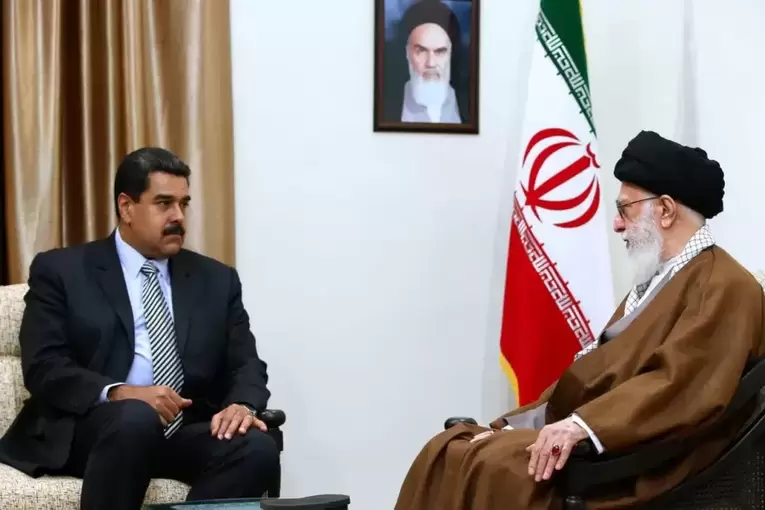|
6/12/2022 Anti-Imperialist Solidarity Against US Sanctions: Iran and Venezuela Sign Twenty Year Cooperation Agreement. By: N.C. CaiRead NowAfter being snubbed from attending the Summit of Americas, President Maduro of Venezuela signed a twenty year cooperation agreement with President Ebrahaim Raisi in Tehran. In a joint conference, the two leaders agreed to raise bilateral relations to a “strategic level” and would work to expand ties in energy, science, trade, and tourism. Although the exact details of the cooperation agreement are unknown, the meeting focused mostly on economic issues and cooperation under US sanctions. In addition, Maduro recently announced that direct flights between Caracas and Tehran would be established beginning on July 18th. Both countries have had extensive sanctions forced upon them by the US due to their shared rejection of US hegemony and petro-nationalism. The sanctions have resulted in Venezuela’s government losing 99% of its revenue, meaning that the country is living on 1% of its pre-sanctions income. The sanctions have resulted in massive inflation and shortages of food, household goods, and medicine, which the West blamed on the Maduro government and socialism. Iran’s economy has also faced a similar spike in inflation and shortages of important goods such as life saving medicines and medical equipment. However, the shock that the sanctions delivered to these economies is wearing off and the economic situations in both countries are improving, in part due to extensive cooperation between the two countries and other anti-imperialist states. The agreement is a continuation and advancement in the solidarity between the two countries against the tentacles of US imperialism. Iran has been active in helping to combat the damage of US sanctions in Venezuela. It has opened supermarkets with goods produced in both Venezuela and Iran. Goods that previously both countries would have otherwise imported from abroad. The items in the store are sold at similar prices if not cheaper compared to other stores in Caracas. Iran has also sent millions of barrels of oil to combat the damage US sanctions have done to Venezuela’s refineries. The US, however, has frequently intervened with these shipments sometimes by committing literal piracy, as it did on August 14, 2020, by seizing the shipments of oil from Iran and sending them to Houston. Iran and Venezuela have had a strong relationship since the Islamic Revolution in 1979. Venezuela was one of the first countries to recognize the Islamic Republic of Iran. The relationship grew particularly strong during the Chavez era. From 2001-2013, Iran and Venezuela signed about 300 agreements related to various projects such as creating low income housing developments, car factories, and cement plants. The two countries even created a joint development fund and a development bank under Iran’s Export Development Bank (EDBI). Iran’s investments in Venezuela were estimated to be around $15 billion, by 2012. However, these projects have been condemned by the US and its allies for being related to illicit activity, in particular development of Iran’s nuclear capabilities. In 2008, Turkish officials seized a shipment of Iranian containers headed for Venezuela, which they suspected to be materials for an explosives lab. Furthermore, the EDBI was sanctioned by both the United States and European Union for being allegedly related to Iran’s “nuclear weapons program.” The cooperation agreement between Iran and Venezuela is not only an advancement in Iranian-Venezuelan relations but also a major step forward in the resistance of US hegemony and sanctions in the global south. Since the start of the Russia-Ukraine War, there has been a wave towards de-dollarization with Russia and India trading oil in rupees, despite the threat of US sanctions. China and Saudi Arabia also contemplated trading oil in yuan instead of dollars. Several countries in the European Union have agreed to pay for Russian gas in rubles. In Latin America, upon hearing that the Troika of Resistance (Cuba, Venezuela, and Nicaragua) had been rejected from attending the Summit of Americas several countries such as Mexico, Brazil, Guatemala, and Bolivia condemned the decision and declared that they wouldn’t attend or that they would only send minor representatives to the conference. Russia has also made important steps in weakening the Nazi presence in Ukraine and the ruble is at an all time high. While it might not look like it, the days of US imperialism are numbered. The shock of sanctions will wear off and be rendered useless. If anything, sanctions have taught the global south a variety of important lessons: dedollarize, create an independent economy, bolster relations with other countries outside of the West, and do not rely on the United States. The relationship between Iran and Venezuela is only a microcosm of a greater phenomenon. AuthorN.C. Cai is a Chinese American Marxist Feminist. She is interested in socialist feminism, Western imperialism, history, and domestic policy, specifically in regards to drug laws, reproductive justice, and healthcare. Archives June 2022
0 Comments
Leave a Reply. |
Details
Archives
July 2024
Categories
All
|

 RSS Feed
RSS Feed